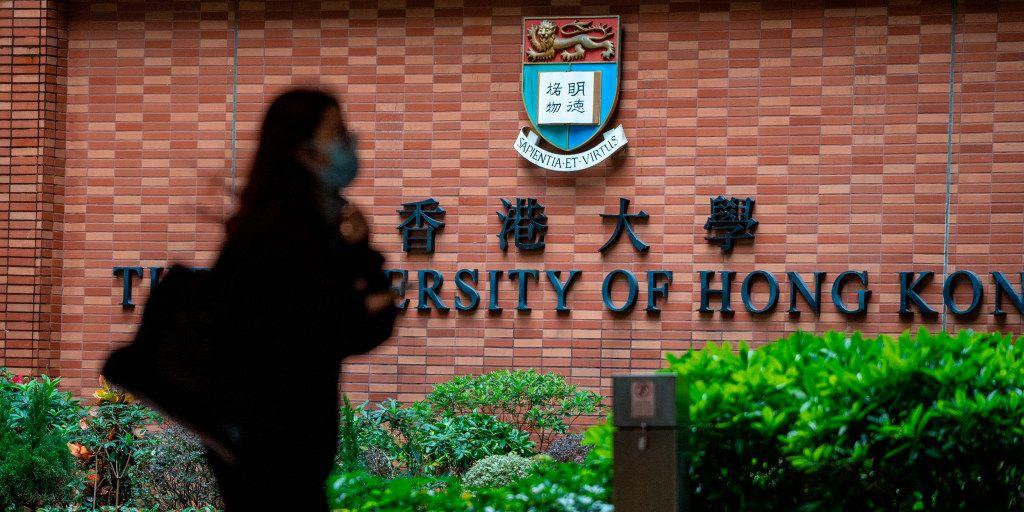Hong Kong Grapples with AI-Generated Pornography Scandal, Exposing Legal and Social Challenges
3 Sources
3 Sources
[1]
AI porn victims see Hong Kong unprepared for threat
For Hong Kong law student "C," AI-made pornography was a distant danger until a university classmate created graphic images of her and multiple other women. "At first I was shocked, then it turned into panic," said the 20-year-old, describing the ordeal as a "wound that will leave a scar." C was one of three women who exposed an AI porn scandal at Hong Kong's oldest university last month, sparking huge debate around what had largely been seen as an overseas phenomenon. The victims, who spoke to AFP on condition of anonymity, and experts said the city was ill-prepared to counter the fast-growing threat. In the University of Hong Kong (HKU) case, hundreds of images of at least 20 women were discovered on the student's laptop. "B," another of those who spoke out, said she felt betrayed as she had considered the perpetrator a friend. "I felt like my privacy was violated... like I couldn't trust the people around me," she said. The university's initial response was to give the student a warning letter and make him apologize. The third woman, "A," said she was told by staff the case couldn't be heard before a disciplinary committee. "They were concerned but didn't know what they could do... We felt that was a bit ridiculous." HKU told AFP it "has been in contact with the students involved" but cannot comment further with the case under active review. Damage may 'never end' While the HKU case has thrust AI-made porn into the spotlight, it is not the city's first. Janice, a woman in her late 20s who also asked to use a pseudonym, told AFP she was devastated a few years ago when fake obscene images were sent to her friends. She never found the culprit and worried that the damage might "never end." "I tried skipping work and didn't dare to go out on the street," she said, adding that she had suicidal thoughts and would suddenly burst into tears. "I couldn't sleep because I was afraid I would wake up to see the whole internet filled with (pornographic) images of me." Hong Kong's Association Concerning Sexual Violence Against Women received 11 similar requests for help in 2024-25. "We have observed an uptick... Some cases may be hidden if (victims) don't know how to seek help," executive director Doris Chong said. Janice doubted she had enough evidence to persuade police to help, adding that she felt society will "never find a way" to punish canny offenders. Type of 'sexual violence' An estimated 90% of AI-made porn victims are women, Susanne Choi from the Chinese University of Hong Kong told AFP, "suggesting that it is a form of gender-based sexual violence." Asked for the number of recent cases involving deepfake pornography, police said they did not maintain such figures. Lawmakers and universities need to "expand and revise existing laws and procedures to better cope with... technology-facilitated sexual harassment," Choi argued. Discussions in Britain and Singapore show a growing willingness to penalize its creation, though opinion is split on possession, according to Hong Kong barrister Stephen Keung. Hong Kong currently criminalizes the distribution of "intimate images," including AI-made ones, but not their creation or possession. That made legal action in the HKU case difficult as there was no evidence that the pictures were circulated. After the women went public with the scandal, however, Hong Kong's privacy watchdog launched a criminal investigation, and the Equal Opportunities Commission is handling a related complaint. Dignity 'undermined' The three students said they have had to deal with public backlash. Once an avid social media user, C temporarily stopped posting, worried about who else "would screengrab my photos for what purpose." "Many commenters said... 'You are ruining the guy's future, you should apologize to him'," she said, saying she endured periods of self-doubt. The student has not been named and AFP was unable to reach him for comment. B said the trio did not want to "play judge" but believed offenders should face long-term consequences. "The mere creation (of AI porn) is a problem... My bodily autonomy, my privacy, my dignity were undermined by it," B said. "If a line must be drawn, it should be drawn at creation."
[2]
AI porn victims see Hong Kong unprepared for threat
Hong Kong (AFP) - For Hong Kong law student "C", AI-made pornography was a distant danger until a university classmate created graphic images of her and multiple other women. "At first I was shocked, then it turned into panic," said the 20-year-old, describing the ordeal as a "wound that will leave a scar". C was one of three women who exposed an AI porn scandal at Hong Kong's oldest university last month, sparking huge debate around what had largely been seen as an overseas phenomenon. The victims, who spoke to AFP on condition of anonymity, and experts said the city was ill-prepared to counter the fast-growing threat. In the University of Hong Kong (HKU) case, hundreds of images of at least 20 women were discovered on the student's laptop. "B", another of those who spoke out, said she felt betrayed as she had considered the perpetrator a friend. "I felt like my privacy was violated... like I couldn't trust the people around me," she said. The university's initial response was to give the student a warning letter and make him apologise. The third woman, "A", said she was told by staff the case couldn't be heard before a disciplinary committee. "They were concerned but didn't know what they could do... We felt that was a bit ridiculous." HKU told AFP it "has been in contact with the students involved" but cannot comment further with the case under active review. Damage may 'never end' While the HKU case has thrust AI-made porn into the spotlight, it is not the city's first. Janice, a woman in her late 20s who also asked to use a pseudonym, told AFP she was devastated a few years ago when fake obscene images were sent to her friends. She never found the culprit and worried that the damage might "never end". "I tried skipping work and didn't dare to go out on the street," she said, adding that she had suicidal thoughts and would suddenly burst into tears. "I couldn't sleep because I was afraid I would wake up to see the whole internet filled with (pornographic) images of me." Hong Kong's Association Concerning Sexual Violence Against Women received 11 similar requests for help in 2024-25. "We have observed an uptick... Some cases may be hidden if (victims) don't know how to seek help," executive director Doris Chong said. Janice doubted she had enough evidence to persuade police to help, adding that she felt society will "never find a way" to punish canny offenders. Type of 'sexual violence' An estimated 90 percent of AI-made porn victims are women, Susanne Choi from the Chinese University of Hong Kong told AFP, "suggesting that it is a form of gender-based sexual violence". Asked for the number of recent cases involving deepfake pornography, police said they did not maintain such figures. Lawmakers and universities need to "expand and revise existing laws and procedures to better cope with... technology-facilitated sexual harassment", Choi argued. Discussions in Britain and Singapore show a growing willingness to penalise its creation, though opinion is split on possession, according to Hong Kong barrister Stephen Keung. Hong Kong currently criminalises the distribution of "intimate images", including AI-made ones, but not their creation or possession. That made legal action in the HKU case difficult as there was no evidence that the pictures were circulated. After the women went public with the scandal, however, Hong Kong's privacy watchdog launched a criminal investigation, and the Equal Opportunities Commission is handling a related complaint. Dignity 'undermined' The three students said they have had to deal with public backlash. Once an avid social media user, C temporarily stopped posting, worried about who else "would screengrab my photos for what purpose". "Many commenters said... 'You are ruining the guy's future, you should apologise to him'," she said, saying she endured periods of self-doubt. The student has not been named and AFP was unable to reach him for comment. B said the trio did not want to "play judge" but believed offenders should face long-term consequences. "The mere creation (of AI porn) is a problem... My bodily autonomy, my privacy, my dignity were undermined by it," B said. "If a line must be drawn, it should be drawn at creation."
[3]
AI porn victims see Hong Kong unprepared for threat - The Economic Times
For Hong Kong law student "C", AI-made pornography was a distant danger until a university classmate created graphic images of her and multiple other women. Hong Kong currently criminalises the distribution of "intimate images", including AI-made ones, but not their creation or possession.For Hong Kong law student "C", AI-made pornography was a distant danger until a university classmate created graphic images of her and multiple other women. "At first I was shocked, then it turned into panic," said the 20-year-old, describing the ordeal as a "wound that will leave a scar". C was one of three women who exposed an AI porn scandal at Hong Kong's oldest university last month, sparking huge debate around what had largely been seen as an overseas phenomenon. The victims, who spoke to AFP on condition of anonymity, and experts said the city was ill-prepared to counter the fast-growing threat. In the University of Hong Kong (HKU) case, hundreds of images of at least 20 women were discovered on the student's laptop. "B", another of those who spoke out, said she felt betrayed as she had considered the perpetrator a friend. "I felt like my privacy was violated... like I couldn't trust the people around me," she said. The university's initial response was to give the student a warning letter and make him apologise. The third woman, "A", said she was told by staff the case couldn't be heard before a disciplinary committee. "They were concerned but didn't know what they could do... We felt that was a bit ridiculous." HKU told AFP it "has been in contact with the students involved" but cannot comment further with the case under active review. Damage may 'never end' While the HKU case has thrust AI-made porn into the spotlight, it is not the city's first. Janice, a woman in her late 20s who also asked to use a pseudonym, told AFP she was devastated a few years ago when fake obscene images were sent to her friends. She never found the culprit and worried that the damage might "never end". "I tried skipping work and didn't dare to go out on the street," she said, adding that she had suicidal thoughts and would suddenly burst into tears. "I couldn't sleep because I was afraid I would wake up to see the whole internet filled with (pornographic) images of me." Hong Kong's Association Concerning Sexual Violence Against Women received 11 similar requests for help in 2024-25. "We have observed an uptick... Some cases may be hidden if (victims) don't know how to seek help," executive director Doris Chong said. Janice doubted she had enough evidence to persuade police to help, adding that she felt society will "never find a way" to punish canny offenders. Type of 'sexual violence' An estimated 90% of AI-made porn victims are women, Susanne Choi from the Chinese University of Hong Kong told AFP, "suggesting that it is a form of gender-based sexual violence". Asked for the number of recent cases involving deepfake pornography, police said they did not maintain such figures. Lawmakers and universities need to "expand and revise existing laws and procedures to better cope with... technology-facilitated sexual harassment", Choi argued. Discussions in Britain and Singapore show a growing willingness to penalise its creation, though opinion is split on possession, according to Hong Kong barrister Stephen Keung. Hong Kong currently criminalises the distribution of "intimate images", including AI-made ones, but not their creation or possession. That made legal action in the HKU case difficult as there was no evidence that the pictures were circulated. After the women went public with the scandal, however, Hong Kong's privacy watchdog launched a criminal investigation, and the Equal Opportunities Commission is handling a related complaint. Dignity 'undermined' The three students said they have had to deal with public backlash. Once an avid social media user, C temporarily stopped posting, worried about who else "would screengrab my photos for what purpose". "Many commenters said... 'You are ruining the guy's future, you should apologise to him'," she said, saying she endured periods of self-doubt. The student has not been named and AFP was unable to reach him for comment. B said the trio did not want to "play judge" but believed offenders should face long-term consequences. "The mere creation (of AI porn) is a problem... My bodily autonomy, my privacy, my dignity were undermined by it," B said. "If a line must be drawn, it should be drawn at creation."
Share
Share
Copy Link
A recent AI-generated pornography scandal at the University of Hong Kong has sparked a debate on the city's preparedness to handle such technology-facilitated sexual harassment, highlighting the need for updated laws and support systems.
AI Porn Scandal Exposes Hong Kong's Unpreparedness
A recent scandal at the University of Hong Kong (HKU) has thrust the issue of AI-generated pornography into the spotlight, revealing Hong Kong's lack of readiness to address this growing technological threat. The incident, involving a student who created hundreds of graphic images of at least 20 women using AI, has sparked a significant debate about what was previously considered a predominantly overseas phenomenon
1
2
3
.
Source: ET
Victims' Experiences and Emotional Toll
Three women, identified as A, B, and C, came forward to expose the scandal. C, a 20-year-old law student, described the ordeal as "a wound that will leave a scar." B expressed feeling betrayed, as she had considered the perpetrator a friend. The victims reported feelings of violated privacy and a loss of trust in those around them
1
2
.The emotional impact of such incidents can be severe and long-lasting. Janice, another victim of AI-generated pornography, shared her experience from a few years ago:
"I tried skipping work and didn't dare to go out on the street," she said, adding that she had suicidal thoughts and would suddenly burst into tears. "I couldn't sleep because I was afraid I would wake up to see the whole internet filled with (pornographic) images of me."
1
2
3
Institutional Response and Legal Challenges
The university's initial response to the incident was criticized as inadequate. The perpetrator was given a warning letter and made to apologize, while victims were told the case couldn't be heard before a disciplinary committee
1
2
3
.
Source: Tech Xplore
Hong Kong's current legal framework poses significant challenges in addressing AI-generated pornography. While the distribution of "intimate images," including AI-made ones, is criminalized, their creation and possession are not
1
2
3
. This legal gap made it difficult to take action in the HKU case, as there was no evidence of image distribution.Gender-Based Violence and Societal Impact
Experts argue that AI-generated pornography is a form of gender-based sexual violence. Susanne Choi from the Chinese University of Hong Kong estimates that 90% of AI-made porn victims are women
1
2
3
. The Association Concerning Sexual Violence Against Women in Hong Kong reported receiving 11 requests for help related to AI-generated pornography in 2024-25, indicating a growing trend1
2
.Call for Legal and Procedural Reforms
The incident has highlighted the urgent need for legal and procedural reforms to address technology-facilitated sexual harassment. Experts and victims alike are calling for expanded and revised laws to better cope with these emerging threats
1
2
3
.Discussions in countries like Britain and Singapore show a growing willingness to penalize the creation of AI-generated pornography, though opinions remain divided on the possession of such material
1
2
3
.Related Stories
Public Reaction and Victim Blaming
The victims have faced public backlash, with some commenters accusing them of ruining the perpetrator's future. This reaction has led to periods of self-doubt and withdrawal from social media for some of the affected women
1
2
3
.Moving Forward
As Hong Kong grapples with this new form of sexual harassment, the victims emphasize the need for long-term consequences for offenders. They argue that the mere creation of AI-generated pornography is a violation of bodily autonomy, privacy, and dignity
1
2
3
.In response to the public outcry, Hong Kong's privacy watchdog has launched a criminal investigation, and the Equal Opportunities Commission is handling a related complaint
1
2
3
. These actions may pave the way for more comprehensive measures to address the challenges posed by AI-generated pornography in the future.References
Summarized by
Navi
[1]
[2]
Related Stories
Recent Highlights
1
Pentagon threatens to cut Anthropic's $200M contract over AI safety restrictions in military ops
Policy and Regulation

2
ByteDance's Seedance 2.0 AI video generator triggers copyright infringement battle with Hollywood
Policy and Regulation

3
OpenAI closes in on $100 billion funding round with $850 billion valuation as spending plans shift
Business and Economy








